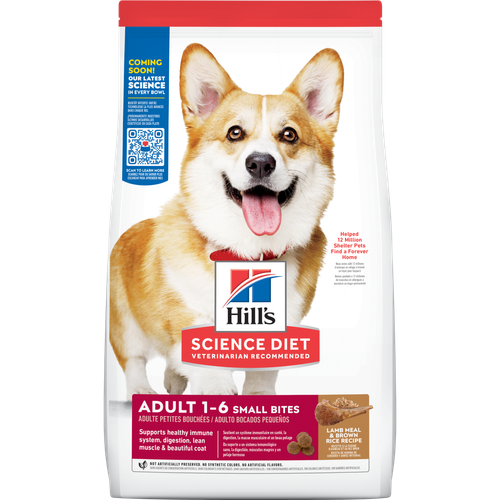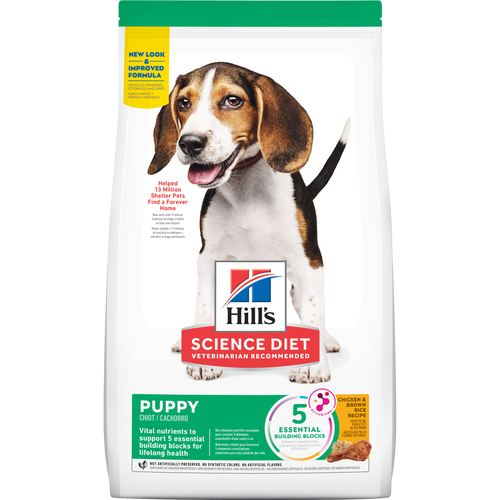
-
Find the right food for your petTake this quiz to see which food may be the best for your furry friend.Find the right food for your petTake this quiz to see which food may be the best for your furry friend.Featured products
 Adult Small Bites Chicken & Barley Recipe Dog Food
Adult Small Bites Chicken & Barley Recipe Dog FoodSupports lean muscle for dogs who prefer smaller kibble
Shop Now Hill's Science Diet Adult Oral Care Chicken, Brown Rice & Barley Recipe Dog Food
Hill's Science Diet Adult Oral Care Chicken, Brown Rice & Barley Recipe Dog FoodClinically proven kibble technology to reduce plaque & tartar build-up
Shop Now Adult Small Bites Lamb Meal & Brown Rice Recipe Dog Food
Adult Small Bites Lamb Meal & Brown Rice Recipe Dog FoodSupports lean muscle, for dogs who prefer smaller kibble
Shop NowFeatured products Hill's Science Diet Adult 7+ Healthy Cuisine Roasted Chicken & Rice Medley Cat Food
Hill's Science Diet Adult 7+ Healthy Cuisine Roasted Chicken & Rice Medley Cat FoodDelicious roasted chicken and rice in a mouthwatering sauce
Shop Now Adult Perfect Digestion Chicken, Barley & Whole Oats Recipe Dog Food
Adult Perfect Digestion Chicken, Barley & Whole Oats Recipe Dog FoodScience Diet's breakthrough nutrition supports ultimate digestive well-being & healthy microbiome
Shop Now Adult Perfect Digestion Salmon, Whole Oats, and Brown Rice Recipe Dog Food
Adult Perfect Digestion Salmon, Whole Oats, and Brown Rice Recipe Dog FoodScience Diet's breakthrough nutrition supports ultimate digestive well-being & healthy microbiome
Shop Now -
Featured articles
 The Incredible Science Behind Your Pet's Microbiome
The Incredible Science Behind Your Pet's MicrobiomeLearn what a pet's microbiome is, how it contributes to your pet's gut & overall health, and why nutrition is important in maintaining healthy microbiomes.
Read More Water
WaterDiscover why water is the most important nutrient for your dog or cat to live a healthy life. Find out how much water your pet should consume each day.
Read More Pet Food Storage Tips
Pet Food Storage TipsDiscover how and where to store your dry, as well as canned, dog and cat food. Learn how to find the "best before" dates on all Hill's pet food packaging.
Read More -


ADULT DOG CARE
Different Dogs with Different Needs
A dog between the ages of 1 and 6 years of age is considered an adult dog. In general, these dogs need nutrition with controlled levels of phosphorus, sodium, protein and energy.
But different dogs have different needs. In order to determine the unique nutritional needs for your adult dog, assess his activity level. Some questions to consider:
- Is your dog a hunting, sport or working dog?
- Does your dog get an average amount of exercise through daily playing and walks?
- Does your dog have a low activity level and tend to gain weight easily?
Proper nutrition can also help with problems such as bad breath, sensitive skin or sensitive stomach issues. Labrador retrievers, golden retrievers, Cairn terriers, cocker spaniels, dachshunds, pugs, Shetland sheepdogs, basset hounds and beagles are prone to obesity, so keep breed tendencies in mind when choosing your dog's food.


Tasty Tips
A common concern for adult dogs is kidney health. Dietary phosphorus, protein and salt excesses may exacerbate the progression of kidney damage that leads to kidney failure and death. Therefore, unbalanced high amounts of phosphorus, protein and salt are all nutritional risk factors. Some commercial pet foods contain excess protein, phosphorus, calcium and salt. These excess nutrients must be excreted through the kidneys, and become nutritional risk factors.


One of our staff authors prepared this article for you
Related products

Clinically proven kibble technology to reduce plaque & tartar build-up

Supports lean muscle for dogs who prefer smaller kibble

Supports lean muscle, for dogs who prefer smaller kibble

Vital nutrients to support 5 essential building blocks for lifelong health
Related articles

Discover how the field of dog science is giving us more and more insights into the inner workings of our furry best friends.

Gather the following puppy supplies to prepare your family for all the fun (and commitment) that comes with being a dog parent.

Your dog's coat and skin are a big part of your dog's overall health. Ensure you keep your dog's coat healthy, by following these simple tips.

Learn how to stop your dog from begging at the dinner table, and understand how it can help contribute to his health.

Put your dog on a diet without them knowing
Our low calorie formula helps you control your dog's weight. It's packed with high-quality protein for building lean muscles, and made with purposeful ingredients for a flavorful, nutritious meal. Clinically proven antioxidants, Vitamin C+E, help promote a healthy immune system.
Put your dog on a diet without them knowing
Our low calorie formula helps you control your dog's weight. It's packed with high-quality protein for building lean muscles, and made with purposeful ingredients for a flavorful, nutritious meal. Clinically proven antioxidants, Vitamin C+E, help promote a healthy immune system.

